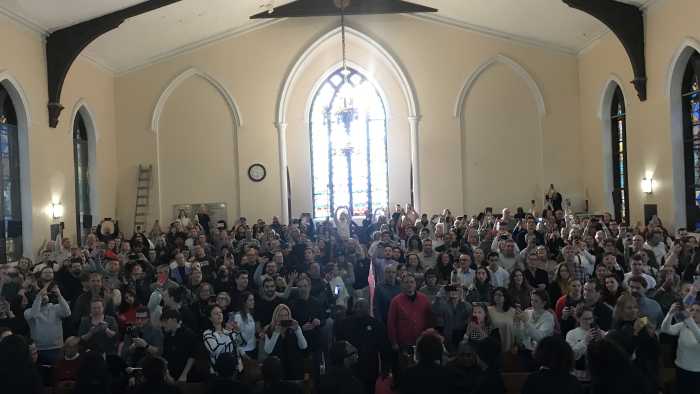By Albert Amateau
Real estate developers and brokers who were expecting a bonanza of opportunities when the estate of William Gottlieb began selling some of the 185 properties it owns, mostly in Greenwich Village and the Meatpacking District, were disappointed earlier this month.
While Neil Bender, heir of the holdings accumulated by his uncle Bill Gottlieb, confirmed the December sale of 79 Horatio St., just south of the Meatpacking District, and the posting for sale of 104 E. 10th St., near St. Mark’s Church-in-the-Bowery, the estate will not be putting any other properties on the block.
In fact, Bender intends to renew the company’s long-held policy of buying and holding onto select properties.
“We are not selling any more properties,” Gregg Sullivan, a spokesperson for Bender, said last week. “We’re disposing of two properties that do not fit in with the company’s development and growth plan, and we anticipate the addition of significant and strategic properties to our portfolio in 2011 and beyond,” Sullivan said.
Both 79 Horatio St., which fetched less than $7 million at the end of last year, and 104 E. 10th St., currently listed for sale by Halstead Property for $6 million, are protected by the New York City Landmarks Preservation Commission’s historic district designations. The five-story walkup on Horatio St., a block from the High Line, is within the Greenwich Village Historic District. The three-story townhouse at 104 E. 10th St. is part of an extension of the St. Mark’s Historic District. The East Village building dates from 1879 when it was built for Rutherford Stuyvesant, a descendant of Peter Stuyvesant, along with the adjacent 102 E. 10th St.
The 1870 Horatio St. building, now owned by an undisclosed purchaser, was formerly held by the Gottlieb estate in partnership with Vicky Gabay, whose husband, Don, was an old high school and college friend of Bill Gottlieb’s. Don Gabay and Gottlieb bought the building together in 1969 for a reputed $68,000. It was the only partnership property in the Gottlieb portfolio, and after Bill died in 1999 it passed to Vicky Gabay and Mollie Bender, Gottlieb’s sister.
But Mollie Bender and the Gabays had a falling out over management of the building. When Mollie died in 2007, the dispute continued between Vicky Gabay and Mollie’s heirs — her husband, Irving Bender, and her son, Neil.
In 2008, there was a court-ordered auction of the Horatio St. property to settle the dispute. Neil Bender bested Gabay with a $7.4 million bid, but had to give her half the money under the conditions of the court-ordered auction.
Another complication arose after Mollie died. Her daughter, Cheryl Dier, who was cut out of any interest in the real estate empire, filed suit in Surrogate’s Court in Manhattan, challenging Neil Bender’s fitness to run the Gottlieb real estate holdings. The surrogate ruled that there was no evidence that Neil was not able to handle the estate, and an appellate court upheld that decision last May.
Cary Tamarkin, who has developed several buildings adjacent to Gottlieb properties over the years, said he was still hoping to join the market for any other Gottlieb property that came online.
“That would be really big news when it happens,” Tamarkin said.
Gottlieb and his heirs have earned the reputation of “preservationists by benign neglect,” by acquiring and holding low-rise, old buildings in gentrified historic areas and making little or no improvements to them.
Among the holdings of special interest to preservation advocates is the 1831 triangular brick building, the Northern Dispensary, at 165 Waverly Place, near the intersection of Grove and Christopher Sts. The building, where Edgar Allan Poe was reputed to have visited for medical treatment, has a restrictive covenant in its deed limiting the property to medical use. It was last used as a dental facility by Catholic Charities but has been vacant since Gottlieb acquired it from the New York Catholic Archdiocese in 1998.






































